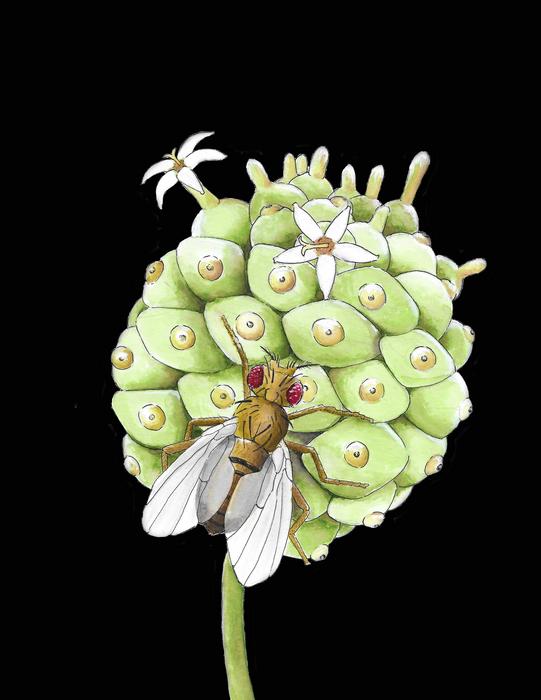RIVERSIDE, Calif. — A team led by University of California, Riverside, scientists has cracked the puzzle of why Drosophila sechellia, a fly endemic to the Seychelles, is the only fly attracted to a fruit growing on this archipelago of islands in the Indian Ocean.

Credit: Taylor N. Black.
RIVERSIDE, Calif. — A team led by University of California, Riverside, scientists has cracked the puzzle of why Drosophila sechellia, a fly endemic to the Seychelles, is the only fly attracted to a fruit growing on this archipelago of islands in the Indian Ocean.
D. sechellia is a species of Drosophila that is highly specialized. It survives on noni (Morinda citrifolia), a fruit-bearing tree that grows in the Seychelles. Noni fruit is toxic to all other Drosophila species because its fatty acids kill their larvae. D. sechellia, however, has evolved a preference for this fruit.
“Evolutionarily, two changes have taken place in D. sechellia,” said Anupama Dahanukar, a professor of molecular, cell and systems biology and the corresponding author of the study that appears in Cell Reports. “The behavior of this fly has changed, and it is physiologically able to tolerate the toxins in the fatty acids. We are interested in understanding how its nervous system has evolved to make a behavioral change.”
In the lab, the researchers compared D. sechellia to two generalist fly species, D. melanogaster and D. simulans. The two generalist species avoided feeding on noni fatty acids. D. sechellia, on the other hand, fed on these acids. The researchers determined that noni fatty acids activate bitter taste neurons in the flies and inhibit their sweet taste neurons. In other words, bitterness is activated and sweetness is suppressed.
The bitter sensing neurons send a negative signal in terms of behavior. In D. sechellia, however, these neurons are less sensitive to some of the fatty acids, thus weakening the negative signal. The fatty acids were found also to suppress positive signals by inhibiting the sugar response. This inhibition is weaker in D. sechellia.
“The outcome is that D. sechellia prefers the noni fruit,” said Manali Dey, the lead author of the research paper and Dahanukar’s former graduate student. “It chooses to eat the fruit and lay eggs on it while other flies choose to avoid the fruit. This gives D. sechellia an evolutionary advantage.”
Dahanukar’s lab is interested in expanding the analysis to other Drosophila species.
“Such an analysis could give us clues to the sequence of events that lead to behavioral evolution,” Dahanukar said. “It would be interesting to compare several closely related fly species and piece together what step-by-step process occurred. This could help us understand how variation in taste affects dietary preferences in organisms.”
Dahanukar explained that D. sechellia’s taste system has not been the focus of much scientific inquiry. Instead, attention has been paid to the olfactory system and differences in olfactory behavior.
“But ultimately, the fly has to land on food and taste it,” she said. “Feeding behavior is closely linked to taste sensory function. Ours is the first comparison of noni taste responses in three closely related fly species that reveals differences in taste sensitivities that correlate with dietary preferences. How the nervous system evolves so that insects adapt to various host plants is an important fundamental question to explore.”
Dey, now a postdoctoral researcher at UC Irvine, added that an understanding of the genetic changes that allow insects to adapt to host plants and develop tolerance for host plant toxins could be useful for controlling agricultural pests.
“A significant constraint in investigating such mechanisms in insect pests is the lack of genetic tools,” she said. “However the D. sechellia/noni model has an emerging abundance of genetic tools to address these questions.”
Dahanukar and Dey were joined in the research by Sandhya Charlu, a former graduate student of Dahanukar’s who initiated the study, and collaborators Alex Keene and Liz Brown at Texas A&M University.
The research was supported by grants from the National Institutes of Health.
The research paper is titled “Evolution of fatty acid taste in drosophilids.”
The University of California, Riverside is a doctoral research university, a living laboratory for groundbreaking exploration of issues critical to Inland Southern California, the state and communities around the world. Reflecting California’s diverse culture, UCR’s enrollment is more than 26,000 students. The campus opened a medical school in 2013 and has reached the heart of the Coachella Valley by way of the UCR Palm Desert Center. The campus has an annual impact of more than $2.7 billion on the U.S. economy. To learn more, visit www.ucr.edu.
Journal
Cell Reports
DOI
10.1016/j.celrep.2023.113297
Method of Research
Experimental study
Subject of Research
Animals
Article Title
Evolution of fatty acid taste in drosophilids
Article Publication Date
20-Oct-2023
COI Statement
Anupama Dahanukar’s spouse is a founder and president of two startups, Sensorygen Inc. and Remote Epigenetics Inc., and is listed as inventor on multiple patents filed by UC Riverside.




